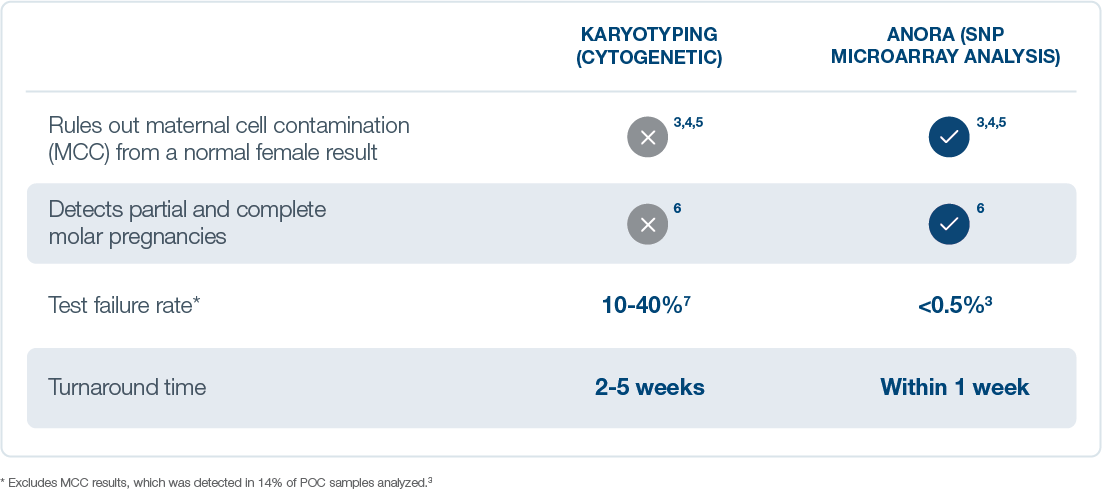Why Perform Miscarriage Genetic Testing?
A miscarriage can be devastating. You are left to grieve and wonder why. Your pain and fear can make it more difficult to move ahead, and you want answers. With the Anora™ miscarriage test, you can get those answers.
The results obtained from chromosome testing after a miscarriage can reduce your emotional burden and improve your chances of a future successful pregnancy. If genetic testing identifies a chromosomal abnormality as the cause, your chances of recurrence are low. Genetic testing can save your provider from performing costly medical work-up to determine the cause of miscarriage.
Schedule a complimentary genetic information session for more information about the Anora™ miscarriage test.
What is a chromosomal abnormality?
Moving forward after a pregnancy loss can be difficult, especially if you have questions that you can’t find answers to. Many people even try to place blame – some on their spouses, some on themselves. In many cases, it’s not what anyone did wrong – there are biological and medical reasons beyond your control. The Anora™ miscarriage test can tell you if the problem is a chromosomal issue.
The genetic conditions that could cause a miscarriage show up in changes in the structure or number of chromosomes. Issues with chromosomes can lead to health conditions and developmental disorders that could significantly impact your life.
These changes can happen when eggs or sperm form, during the early development of the fetus, or in cells after birth.
Some of the causes of chromosomal abnormalities include:
- Errors during cell division, such as nondisjunction, where the chromosomes do not separate properly during cell division
- Inherited genetic mutations
- Environmental factors, such as radiation, certain medications and chemicals
Chromosomal abnormalities can be numerical or structural. If the abnormality is numerical, the number of chromosomes changes. This could cause conditions such as Turner syndrome, Down syndrome and Klinefelter syndrome. You may have an extra chromosome or may be missing a chromosome.
Structural abnormalities are changes in the structure of your chromosomes. They include duplications, deletions, translocations and inversions.
Why choose Anora?
Anora can identify the reason for a miscarriage and rule out chromosomal problems as the cause. It can be used on losses that have recently occurred and on losses that took place several years ago.
Anora is a highly comprehensive chromosome test for miscarriage and returns a result >99% of the time.1 Other advantages:
- Anora can differentiate between maternal and fetal DNA, enabling maternal cell contamination (MCC) to be ruled out.2
- Anora can determine whether a chromosomal abnormality originated in the egg or sperm.2
- Anora’s results are returned quickly—in about one week.
- Anora offers complimentary genetic information sessions before and after testing with board-certified genetic counselors.


What conditions can Anora detect?
- Trisomy—extra or missing chromosomes (e.g., Trisomy 21 (Down syndrome), Trisomy 13 (Patau syndrome), Trisomy 18 (Edward syndrome))
- Triploidy—a complete extra set of chromosomes
- Deletions and duplications—extra or missing pieces of a chromosome
- Uniparental disomy (UPD)—two copies of a chromosome from the same parent with no copies from the other parent
How is the Anora™ Miscarriage Test different from karyotyping?

Is Anora right for me?
Testing can be helpful if you:
- Have had a child or previous pregnancy with a chromosomal abnormality
- Want to better understand why you had a miscarriage
- Have had more than one miscarriage
- Want to understand recurrence risks

Is Anora right for you?
We’re here to help you find out
References
1Maisenbacher et al. Fertil Steril. 2020;114:(3)E47.
2Levy et al.Obstet Gynecol. 2014;123(2 pt1):202-9.
3Maisenbacher, et al. Fertil Steril. 2020;114:(3)E47.
4Shah et al. Fertil Steril. 2017;107(4):1028-33.
5Levy et al. Obstet Gynecol. 2014;123(2 pt1):202-9.
6Maisenbacher et al. Fertil Steril. 2017;112(4):700-6.